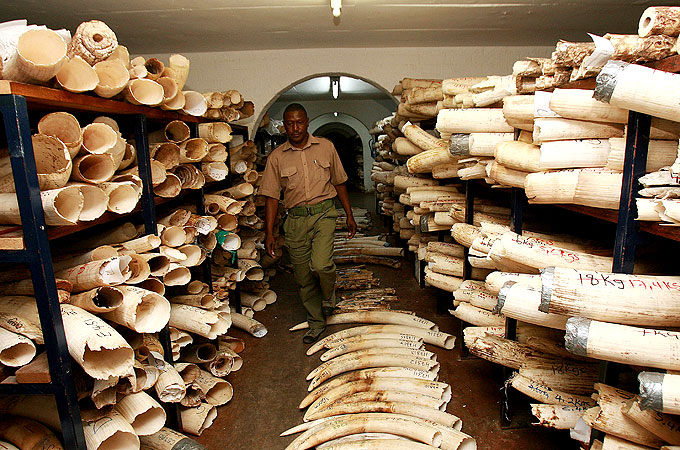Tiger farms and its citizens' high demand for rhino horn as a supposed cure-all helped put it at the top of a WWF list.
Al Jazeera - 23 Jul 2012
South Africa is seen as "epicentre" of the rhino poaching crisis despite government efforts to stop the killings [AFP]
Vietnam is the worst country for wildlife crime, says a report on how well 23 Asian and African countries protect rhinos, tigers and elephants.
The environment group WWF said on Monday that Vietnam's tiger farms and its citizens' high demand for rhino horn as a supposed cure-all helped put it at the top of the list.
Neighbouring China, widely viewed as the world's largest market for illegal wildlife products, finished a close second and Laos was third.
The WWF report focused on countries where the threatened animals live in the wild or are traded or consumed.
The Washington DC-based Brookings Institution has said the illegal wildlife trade is worth an estimated $8bn to $10bn per year in Southeast Asia alone.
Epicentre
The WWF report said Vietnam is "the major destination" for rhino horns trafficked from South Africa, where 448 rhinos were poached last year. Rhino horn can fetch the US street value of cocaine in Asia, where it is crushed and consumed by people who believe - wrongly, doctors say - that it can cure diseases.
It described South Africa as the "epicentre" in an African rhino poaching crisis, despite strong government efforts there that began in 2009 to stop the killings.
A record 448 rhinos were poached in South Africa in 2011, and this year could be even worse with 262 already lost from January to June, according to WWF.
WWF accused the Vietnamese government of doing very little to stop rhino horns from being imported, describing penalties in Vietnam for buying them as not nearly strong enough to act as a deterrent.
It also said Vietnamese diplomats had been arrested or implicated in South Africa for trying to buy rhino horns.
WWF said Chinese authorities should be recognised for their strong and effective efforts to stop the rhino horn trade within their borders. But it accused China and Thailand of being among the worst culprits in allowing the illegal trade of elephant tusks.
"Tens of thousands of African elephants are being killed by poachers each year for their tusks, and China and Thailand are top destinations for illegal African ivory," WWF said.
WWF urged China to improve its enforcement procedures and warn Chinese nationals they would face severe penalties if they were caught illegally importing ivory from Africa.
WWF said China banned using rhino horn for traditional medicines in 1993, and authorities had followed through with periodic crackdowns that were effective in stopping it being sold in pharmacies.
Bright spots
China has also made genuine efforts overall to stop the illegal trade of endangered species' parts, but elephants' ivory remained a big problem because of the huge demand in the world's most populous country, it said.
In Thailand, WWF said the main problem was a unique law that allowed the legal trade in ivory from domesticated elephants.
In reality, this was a "legal loophole" that allowed indistinguishable illegal African ivory to be sold openly in upscale boutiques, it said.
The conservation group said there were some bright spots around the world, with India and Nepal receiving a best-possible "green" score for their efforts to stem the trade in elephants, rhinos and tigers.
WWF said significant efforts had been made globally to save tigers following a summit in Russia two years ago that attracted leaders from the 13 countries with wild populations of the endangered animal.
Still, it warned more than 200 tiger carcasses were being detected each year on the global black market.
"With as few as 3,200 tigers remaining in the wild, every tiger poaching death is a major concern," it said.
It also said Vietnam's 2007 decision to legalise tiger farms on a pilot basis has "undermined" the country's efforts to police illegal trade in tiger products. Vietnam has 11 registered tiger farms.
The 35-page report comes on the heels of a controversy that erupted in May, when international wildlife experts learned that Vietnam's Ministry of Agriculture and Rural Development had in March proposed allowing parts of tigers that die in captivity to be made into traditional medicine on a pilot basis.
Wildlife advocacy groups later said the proposal was designed to effectively legalise trade in tiger products - an accusation Vietnam denied. An official at Prime Minister Nguyen Tan Dung's office told the Associated Press news agency earlier this month that Dung had rejected the proposal.


2 comments:
Finally Cambodia is not accused of been the worst, someone else ! LOL
Yiek cong is the worse of all things on this planet earth,they were the sources of Kambuja's corruptions/killingfield from 20-21st century.Yiek cong worse of the worse when come to abusive on living being and mother earth alike!....They only think for a short term profits,$$$$$ nothing but,$$$$ selling their comrades ass for $$$$.
Post a Comment